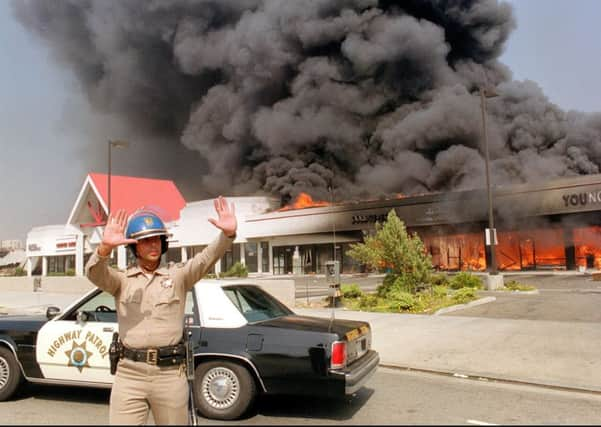Book review: Your House Will Pay, by Steph Cha


The 20th century was shaped by its riots, from those which followed the massacre of protesters in St Petersburg in 1905 and sparked the first Russian Revolution, to the Palestine riots of 1933, the Sri Lankan riots of 1958, the May ‘68 riots in Paris, the Northern Ireland riots of 1969, the Egyptian Bread Riots of 1977 and the anti-Sikh riots in India in 1984. When measured against some of these apocalyptic eruptions of violence, the LA Riots of 1992 might not seem particularly significant – they did not, after all, cause the US government to fall or the nation’s economy to grind to a halt. Still, the numbers speak for themselves: in six days of looting and killing following the acquittal of four police officers for use of excessive force in the arrest of a black suspect, Rodney King, some 63 people were killed and 2,383 were injured. President George HW Bush was forced to call in the 7th Infantry Division and the 1st Marine Division to restore order, and in the end over 12,000 arrests were made and an estimated $1 billion worth of property was destroyed.
Although the riots were motivated by outrage in the black community at the fact that four white police officers had been able to beat up a black suspect and escape unpunished, the overall racial picture was more complicated; much of the violence took place in the area of LA known as Koreatown. Realising that they weren’t going to get any help from the police, the mostly Korean-American residents organised their own security teams to defend their businesses from mostly African-American looters – and it is an incident from this particular chapter of the riots on which Steph Cha’s memorable new novel hinges.
Advertisement
Hide AdAs Cha points out in an author’s note at the end of the book, a secondary flashpoint which followed hot on the heels of the Rodney King verdict was the shooting of a 15-year-old African-American, Latasha Harlins, by a Korean-American shop owner, Soon Ja Du. When Du accused Harlins of trying to steal a bottle of orange juice, a fight broke out, and as Harlins tried to leave the store, Du pulled out a gun from behind the counter and shot her in the back of the head. Even though the incident was caught on video and Du was convicted of voluntary manslaughter, she received no jail time.
For the purposes of her novel, Cha has fictionalised the stories of the two families involved in this incident, and brought them up to the present-day – in Your House Will Pay, the Dus are the Parks, while the Harlinses are the Matthewses.
Twenty-eight years after her crime, Yvonne Park is still living in Koreatown, having changed her name from Jung-Ja Han. She and her husband Paul run a pharmacy and they have two daughters – Miriam, estranged, and Grace, who dutifully helps out with the family business.
Living way out in the suburbs, meanwhile, Shawn Matthews has long-since given up his life as a gang member and now works as a furniture removal man. He is still haunted by the death of his older sister, Ava, however, shot down in front of him by a Korean shop owner called Jung-Ja Han, as is his aunt Sheila, who still campaigns for justice for Ava. As the novel opens, the Matthews clan are preparing to welcome Ray – Shawn’s cousin and Sheila’s son – home from prison. In the decade or so that Ray has been behind bars, Shawn has acted as a surrogate father to his two kids, Darryl and Dasha, and the tension between them is acutely observed. “You were there [for them],” Ray says to Shawn at one point, his voice “quivering between sarcasm and gratitude.”
Still, the tension between Ray and Shawn is as nothing compared to the tension that develops within the two families and, ultimately, between them, after Yvonne Park is shot and seriously wounded outside her pharmacy, and her real identity is revealed online. Suddenly the whole of LA seems to be alive again with the same “wrathful energy” that sparked the riots back in ‘92.
All of this is set up in the first third of the novel, and for the rest of the time Cha provides a masterclass in elegant plotting, dropping new revelations into the narrative with explosive precision. It’s her profound and apparently instinctive understanding of human nature, though, that elevates this book way beyond a mere ripped-from-the-headlines potboiler. She gets, for example, the corrosive ways in which male pride can sometimes lure otherwise rational men into making terrible decisions; she gets the way in which people, even deeply moral people, can sometimes bend and flex their moral codes in order to excuse the actions of their nearest and dearest; and she gets, above all, the intricate and intimate relationships that can develop between those seeking absolution for past crimes and those in a position to grant it.
Advertisement
Hide AdTurning the emotionally charged events of 1992 into a work of fiction was always going to be a gamble, and, given the sensitivities involved, the consequences of getting it wrong could have been severe, but Cha has managed to reach back into the smoke and the pain of that time to create a novel full of wisdom, humanity and hope.
Your House Will Pay, by Steph Cha, Faber & Faber, 320pp, £12.99